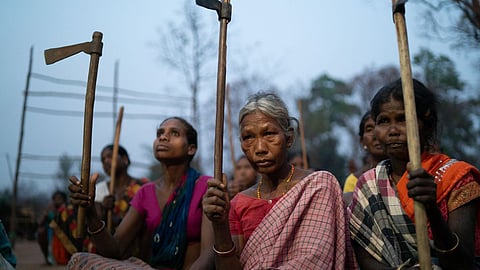
- LIFESTYLE
- FASHION
- FOOD
- ENTERTAINMENT
- EVENTS
- CULTURE
- VIDEOS
- WEB STORIES
- GALLERIES
- GADGETS
- CAR & BIKE
- SOCIETY
- TRAVEL
- NORTH EAST
- INDULGE CONNECT

Award-winning photographer Bhumika Saraswati, who is known for documenting the lives, narratives, and landscapes that are often overlooked or erased, talks about the oppression of Dalit and Adivasi women and how they remain underrepresented in climate discourse in her work Unequal Heat, which is part of the ongoing exhibition by women photographers — It’s Time. To See. To Be Seen.
“The project stems from a deep, intrinsic rage. It’s a rage that arises from seeing visuals that are so extractive that they take from these communities without giving them any recognition. Many marginalised communities, particularly Dalits, are often not seen as leaders. So, my work becomes about documenting the leaders within these communities—farmers, activists—people who are making a difference, who are leading protests, and who have thousands of people standing behind them.”
Throwing more light on the project, Bhumika says, “The concept of climate change and the systematic marginalisation of communities have always been deeply personal for me. It’s not just about the climate crisis but about how it’s affecting these communities in a targeted, systematic way. It was crucial for me to speak about this, to document it visually, because the current representation of these communities often reduces them to mere victims of climate change. If I didn’t capture this, who would? This history could be lost. There might be no visual record of the people fighting to save these lands. For me, it’s about bearing witness and ensuring that there’s a record of these communities’ struggles and efforts to protect our planet, because in the end, they’re the ones on the frontlines.”
Bhumika says that her goal is to shift the narrative. “It’s important to focus on them as problem solvers, and to recognise the injustice they face — not just in the context of climate change, but in the larger context of their systematic oppression. As for the photos in this project, many were taken in central India, specifically in regions like Chhattisgarh and Uttar Pradesh.”
When quizzed about the challenges she faced during her work, she says, “Yes, it’s difficult. You get sick, you face physical and emotional exhaustion, and sometimes the areas you work in are incredibly dangerous, like in regions where illegal mining is rampant. But there’s a strength and resilience in the communities I document, which fuels me to push through. I don’t focus on the obstacles.”
On her upcoming projects, Bhumika says, “One is focused on the environmental impact of plastics and how the production and consumption of plastics disproportionately affect marginalised communities, especially in terms of health. Another project is about forced inclusion — how our communities are often forcefully included in labour systems that ultimately perpetuate their exclusion. All these projects are interconnected.”
She adds, "Climate change is not a singular issue. It intersects with gender, caste, and patriarchy. In India, caste is an issue that is rarely addressed when discussing the climate crisis. But it’s crucial. The combination of caste apartheid and the oppressive structures within it creates the perfect storm for the climate crisis to have a far more devastating impact on marginalised communities. On top of that, patriarchy further compounds the problem. These systemic problems make the climate crisis even more devastating for the communities already suffering. Addressing these interconnected issues is key to understanding the full scope of the crisis and to finding lasting solutions."
Entry free. On till March 16.
At Lalit Kala Akademi.
Email: sangeetha.p@newindianexpress.com
X: @psangeetha2112